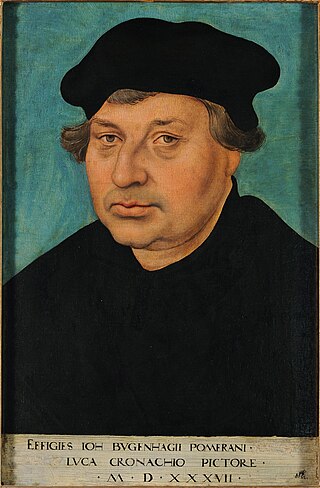
Johannes Bugenhagen, also called Doctor Pomeranus by Martin Luther, was a German theologian and Lutheran priest who introduced the Protestant Reformation in the Duchy of Pomerania and Denmark in the 16th century. Among his major accomplishments was organization of Lutheran churches in Northern Germany and Scandinavia. He has also been called the "Second Apostle of the North".
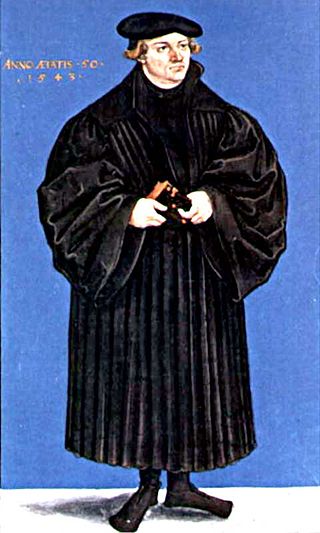
Justus Jonas, the Elder, or simply Justus Jonas, was a German Lutheran theologian and reformer. He was a Jurist, Professor and Hymn writer. He is best known for his translations of the writings of Martin Luther and Philipp Melanchthon. He accompanied Martin Luther in his final moments.
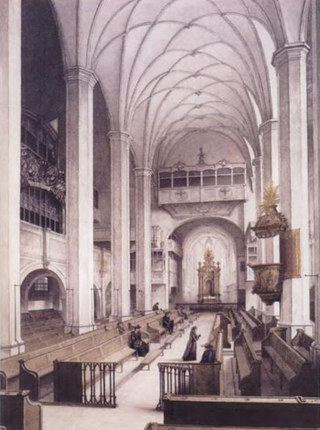
Ach Gott, wie manches Herzeleid, BWV 3, is a church cantata by Johann Sebastian Bach. He composed the chorale cantata in Leipzig for the Second Sunday after Epiphany and first performed it on 14 January 1725. It is based on the hymn published by Martin Moller in 1587.
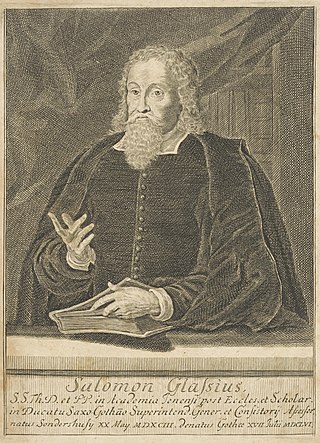
Salomo Glassius was a German theologian and biblical critic born at Sondershausen, in the principality of Schwarzburg-Sondershausen.

Paul Eber was a German Lutheran theologian, reformer and hymnwriter, known for the hymn for the dying, "Herr Jesu Christ, wahr Mensch und Gott".
Throughout his life as a musician, Johann Sebastian Bach composed cantatas for both secular and sacred use. His church cantatas are cantatas which he composed for use in the Lutheran church, mainly intended for the occasions of the liturgical year.

The cantatas composed by Johann Sebastian Bach, known as Bach cantatas, are a body of work consisting of over 200 surviving independent works, and at least several dozen that are considered lost. As far as known, Bach's earliest cantatas date from 1707, the year he moved to Mühlhausen, although he may have begun composing them at his previous post in Arnstadt. Most of Bach's church cantatas date from his first years as Thomaskantor and director of church music in Leipzig, a position which he took up in 1723.

Jesus nahm zu sich die Zwölfe, BWV 22, is a church cantata by Johann Sebastian Bach composed for Quinquagesima, the last Sunday before Lent. Bach composed it as an audition piece for the position of Thomaskantor in Leipzig and first performed it there on 7 February 1723.
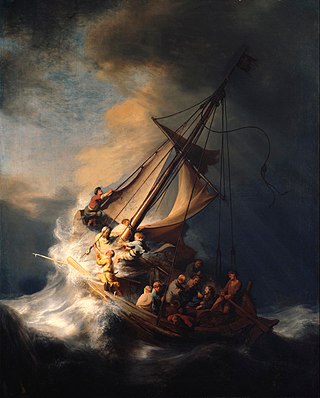
Jesus schläft, was soll ich hoffen?, BWV 81, is a church cantata by Johann Sebastian Bach. He composed it in 1724 in Leipzig for the fourth Sunday after Epiphany and first performed it on 30 January 1724.

Alles nur nach Gottes Willen, BWV 72, is a church cantata by Johann Sebastian Bach. He composed it in Leipzig in 1726 for the third Sunday after Epiphany and first performed it on 27 January 1726. Bach used the opening chorus for the Gloria of his Missa in G minor, BWV 235.

Mein Gott, wie lang, ach lange?, BWV 155, is a church cantata by Johann Sebastian Bach. He first performed it in Weimar on the second Sunday after Epiphany, on 19 January 1716.

Liebster Immanuel, Herzog der Frommen, BWV 123, is a church cantata by Johann Sebastian Bach. He composed the chorale cantata in Leipzig for Epiphany and first performed it on 6 January 1725. It is based on the hymn by Ahasverus Fritsch (1679).
Christian Keymann was a German hymnwriter. He is known for writing the chorale "Meinen Jesum laß ich nicht" in 1658, which served as the base for Bach's chorale cantata Meinen Jesum laß ich nicht, BWV 124, and other compositions.
There are 52 chorale cantatas by Johann Sebastian Bach surviving in at least one complete version. Around 40 of these were composed during his second year as Thomaskantor in Leipzig, which started after Trinity Sunday 4 June 1724, and form the backbone of his chorale cantata cycle. The eldest known cantata by Bach, an early version of Christ lag in Todes Banden, BWV 4, presumably written in 1707, was a chorale cantata. The last chorale cantata he wrote in his second year in Leipzig was Wie schön leuchtet der Morgenstern, BWV 1, first performed on Palm Sunday, 25 March 1725. In the ten years after that he wrote at least a dozen further chorale cantatas and other cantatas that were added to his chorale cantata cycle.
Balthasar Benjamin Kindermann was a German poet.
Johann Sebastian Bach's chorale cantata cycle is the year-cycle of church cantatas he started composing in Leipzig from the first Sunday after Trinity in 1724. It followed the cantata cycle he had composed from his appointment as Thomaskantor after Trinity in 1723.
Picander's cycle of 1728–29 is a cycle of church cantata librettos covering the liturgical year. It was published for the first time in 1728 as Cantaten auf die Sonn- und Fest-Tage durch das gantze Jahr. Johann Sebastian Bach set several of these librettos to music, but it is unknown whether he covered a substantial part of the cycle. This elusive cycle of cantata settings is indicated as the composer's fourth Leipzig cycle, or the Picander cycle.

On Trinity Sunday 27 May 1725 Johann Sebastian Bach had presented the last cantata of his second cantata cycle, the cycle which coincided with his second year in Leipzig. As director musices of the principal churches in Leipzig he presented a variety of cantatas over the next three years. New cantatas for occasions of the liturgical year composed in this period, except for a few in the chorale cantata format, are known as Bach's third cantata cycle. His next cycle of church cantatas, the Picander cycle, did not start before St. John's Day 24 June 1728.

Caspar Ziegler, also Kaspar Ziegler, was a German jurist, poet, hymnwriter and composer. He was the Rektor of the University of Wittenberg.

Aegidius Strauch was a German mathematician and theologian.












